Santen Pharmaceutical Bundle
How did Santen Pharmaceutical become a global eye care leader?
Journey back in time to uncover the fascinating Santen Pharmaceutical SWOT Analysis and the rich history of Santen Pharmaceutical, a Japanese pharmaceutical company that has shaped the world of eye care. From its humble beginnings in 1890, Santen's evolution reflects a remarkable commitment to innovation and patient well-being. Discover how this ophthalmic pharmaceuticals giant navigated over a century of change to become a global force.
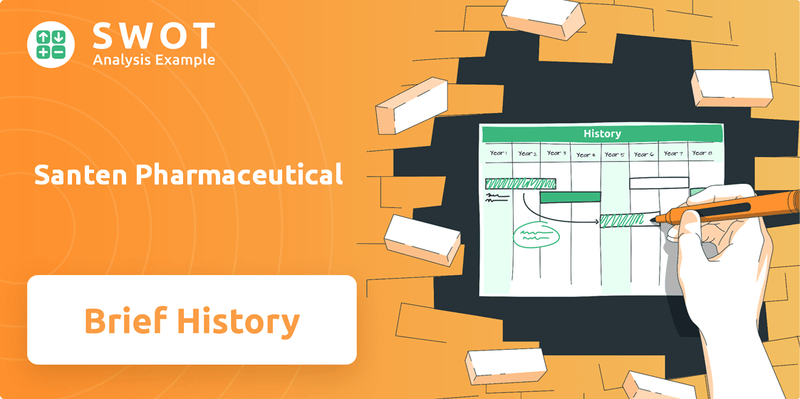
Delving into the brief history of Santen Pharmaceutical Company reveals a story of resilience and vision. Understanding the Santen company timeline, from its early eye care solutions to its current global presence, provides valuable insights. Explore the key milestones that have defined Santen Pharmaceutical's journey and its enduring impact on the treatment of eye diseases worldwide, including glaucoma, dry eye, and macular degeneration.
What is the Santen Pharmaceutical Founding Story?
The brief history of Santen Pharmaceutical began in 1890. This Japanese pharmaceutical company started as Taguchi Santendo, a private firm in Osaka, Japan. The initial focus was on a cold medication, but a shift towards eye care quickly became the company's defining characteristic.
This strategic pivot was driven by the high prevalence of eye disorders in late 19th-century Japan. This created a strong demand for eye drops, a market opportunity that Santen Pharmaceutical capitalized on. The company's early success in eye care set the stage for its future growth and global presence.
The company's early funding appears to have been self-sustained through the success of its initial products, enabling its expansion into eye care.
Santen Pharmaceutical was founded in 1890 as Taguchi Santendo. The company's first eye care product was launched in 1899.
- The initial product was a cold medication, Heburin-gan.
- In 1899, Daigaku Eye Drops were launched, becoming a long-lasting success.
- The company was incorporated in 1914 as a limited partnership.
- In 1925, Santendo Co., Ltd. was formally established.
In 1899, Santen Pharmaceutical launched Daigaku Eye Drops. The product's success supported the company's early growth. The advertising campaign, featuring the catchphrase 'A great eye drop for a rapidly modernizing society' contributed to its popularity. Daigaku Eye Drops remain a longest-selling eye drop in Japan even a century later. The firm was incorporated in 1914 as a limited partnership company, with Chuko Mita joining as a business partner. In 1925, Santendo Co., Ltd. was formally established, and Chuko Mita was appointed as its first president, laying the cornerstone for the company's future development with a focus on eye health.
For more information on the competitive landscape, consider reading about the Competitors Landscape of Santen Pharmaceutical.
Santen Pharmaceutical SWOT Analysis
- Complete SWOT Breakdown
- Fully Customizable
- Editable in Excel & Word
- Professional Formatting
- Investor-Ready Format
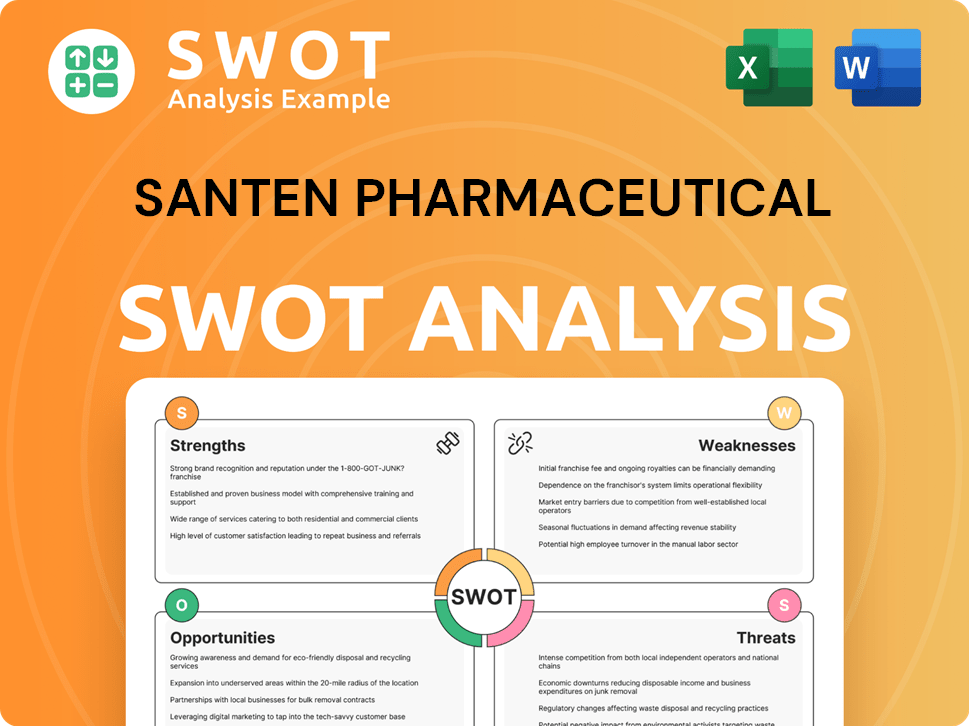
What Drove the Early Growth of Santen Pharmaceutical?
The early growth of Santen Pharmaceutical was marked by a strategic shift towards ophthalmic pharmaceuticals. This pivot, particularly after the challenges of World War II, set the stage for its specialization in eye care. The company's expansion included entering the prescription pharmaceutical business in 1958 and launching innovative products like Mydrin-P in 1962, which significantly advanced ophthalmology in Japan. Subsequent developments in antibiotic ophthalmic solutions and glaucoma treatments further solidified Santen's foundation in the Japanese market.
In 1958, Santen, a Japanese pharmaceutical company, expanded into the prescription pharmaceutical sector. This was a pivotal move, marking a significant evolution in its business strategy. This expansion allowed the company to diversify its product offerings and tap into new markets, contributing to its long-term growth and sustainability.
The launch of Mydrin-P in 1962 was a landmark event for Santen. This innovative eye drop was designed for ophthalmic surgery and diagnosis. Its introduction significantly contributed to the advancement of ophthalmology in Japan, establishing Santen as a key player in the eye care market.
By its centennial in 1990, Santen announced a long-term vision to contribute to society with the best products and services, particularly in eye and health. This period saw continued business growth in Japan, driven by an expanding product lineup and the completion of new plants and laboratories. The company's commitment to innovation and expansion underscored its dedication to global eye health.
The 1990s marked a significant period of international expansion for Santen. Entry into the European market in 1994 was a key step in extending its reach. Further expansion into Asia, with the establishment of its own sales network and production plant in China, accelerated its global presence. This strategic move enhanced its ability to serve a broader international customer base.
Santen Pharmaceutical PESTLE Analysis
- Covers All 6 PESTLE Categories
- No Research Needed – Save Hours of Work
- Built by Experts, Trusted by Consultants
- Instant Download, Ready to Use
- 100% Editable, Fully Customizable
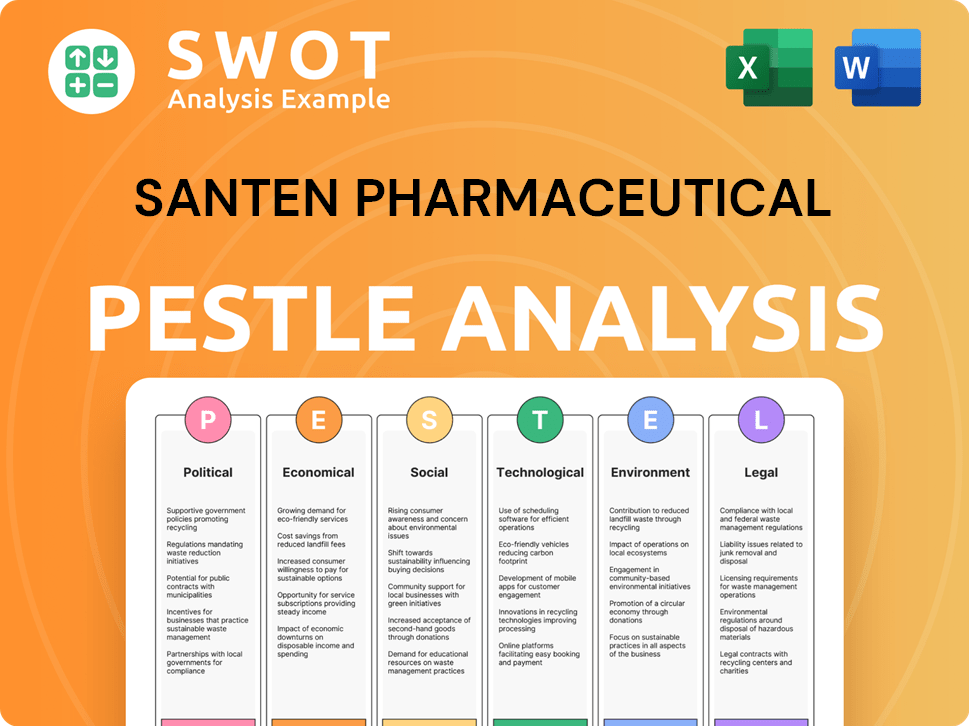
What are the key Milestones in Santen Pharmaceutical history?
The brief history of Santen Pharmaceutical is marked by significant achievements and strategic responses within the ophthalmic pharmaceuticals sector. From pioneering eye drops to strategic acquisitions and global expansions, Santen Pharmaceutical's journey reflects a commitment to innovation and patient care in the eye care industry.
| Year | Milestone |
|---|---|
| 1962 | Launched Mydrin-P, a pioneering eye drop for ophthalmic surgery and diagnosis, significantly advancing the field in Japan. |
| 2014 | Acquired Merck & Co.'s ophthalmology products in select regions, significantly bolstering its product lineup, particularly for glaucoma therapeutics. |
| 2015 | Divested its anti-rheumatic business to concentrate entirely on ophthalmology. |
| 2020 | Acquired Eyevance Pharmaceuticals for $225 million, enhancing its ocular surface and anterior segment product offerings in the U.S. market. |
| 2024 | RYJUSEA® Mini ophthalmic solution, Japan's first ophthalmic solution for slowing myopia progression, received approval for manufacturing and marketing in December. |
Santen Pharmaceutical has consistently focused on innovation in eye care, securing patents for various ophthalmic innovations. The company's commitment to research and development is evident in its exploration of new mechanisms of action and the use of cutting-edge technologies.
The launch of Mydrin-P in 1962 marked a significant advancement in ophthalmic care, providing a crucial tool for ophthalmic surgery and diagnosis.
Santen Pharmaceutical has secured numerous patents for its ophthalmic innovations, contributing to a robust product portfolio.
The company invests heavily in R&D to explore new mechanisms of action and leverage cutting-edge technologies like novel drug delivery systems and biologics.
In December 2024, RYJUSEA® Mini ophthalmic solution received approval in Japan for slowing myopia progression, showcasing its commitment to addressing unmet needs.
Santen Pharmaceutical recently received a positive CHMP opinion for a myopia treatment in Europe, with regulatory approval expected soon.
The acquisition of Eyevance Pharmaceuticals in 2020 for $225 million expanded Santen Pharmaceutical's product offerings in the U.S. market.
Santen Pharmaceutical faces challenges such as generic and biosimilar competition, which it addresses through strategic pricing and patent protection. Operational integration following acquisitions and regulatory uncertainty also present ongoing challenges, requiring careful strategic planning.
The pharmaceutical industry is intensely competitive, with established giants and emerging players vying for dominance in the eye care market.
Santen Pharmaceutical addresses competition through strategic pricing and robust patent protection to maintain its market position.
Operational integration following acquisitions and regulatory uncertainty present ongoing challenges requiring careful strategic planning.
In FY2024, product delivery was impacted by a restoration delay of a manufacturing line and shipment suspension of Diquas LX, though the company met its sales target in Japan.
Santen Pharmaceutical has responded to challenges through strategic pivots, such as divesting its anti-rheumatic business in 2015 to concentrate entirely on ophthalmology.
The company's focus on ophthalmology has enabled it to adapt to evolving market dynamics and maintain its leadership in eye care, as highlighted in this article about Santen Pharmaceutical.
Santen Pharmaceutical Business Model Canvas
- Complete 9-Block Business Model Canvas
- Effortlessly Communicate Your Business Strategy
- Investor-Ready BMC Format
- 100% Editable and Customizable
- Clear and Structured Layout
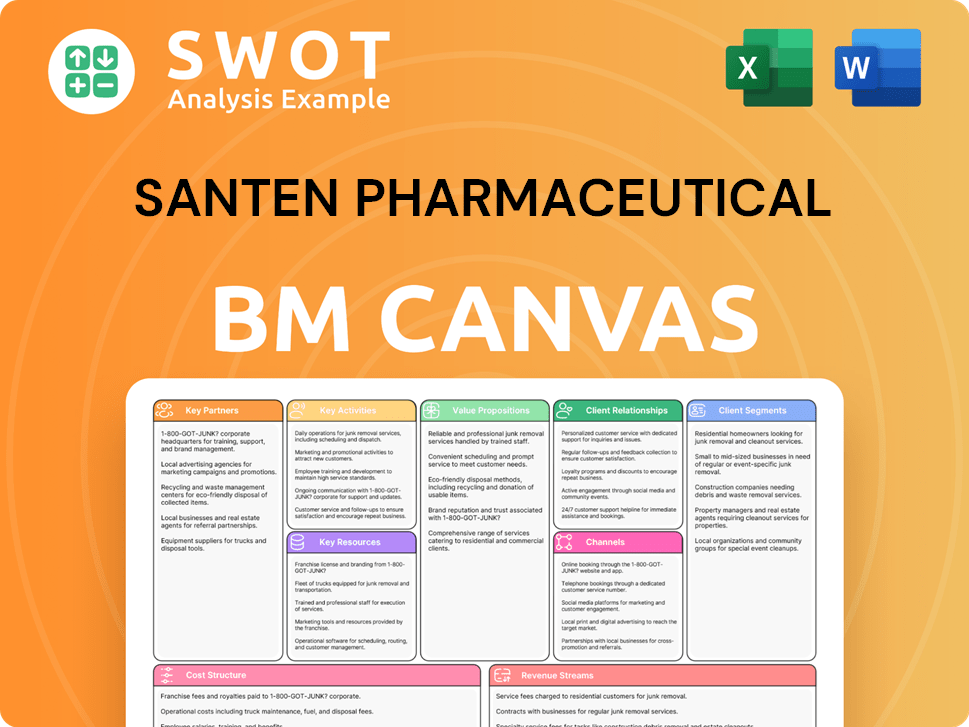
What is the Timeline of Key Events for Santen Pharmaceutical?
The Santen Pharmaceutical journey, a prominent Japanese pharmaceutical company in the eye care sector, is marked by significant milestones, from its establishment in 1890 to its expansion into global markets and strategic acquisitions. This history showcases the company's evolution and commitment to innovation in ophthalmic pharmaceuticals.
| Year | Key Event |
|---|---|
| 1890 | Kenkichi Taguchi establishes Taguchi Santendo in Osaka, Japan, marking the company's inception. |
| 1899 | Launches Daigaku Eye Drops, an early successful product contributing to the company's initial growth. |
| 1925 | Santendo Co., Ltd. is established, with Chuko Mita as its first president. |
| 1958 | Enters the prescription pharmaceutical business, expanding its scope of operations. |
| 1962 | Launches Mydrin-P, an innovative eye drop for ophthalmic surgery and diagnosis. |
| 1990 | Celebrates its 100th anniversary and embarks on a new growth stage with a global vision. |
| 1994 | Enters the European market, broadening its international presence. |
| 2014 | Acquires Merck & Co.'s ophthalmology products in select regions, strengthening its product portfolio. |
| 2015 | Sells its anti-rheumatic pharmaceuticals business to focus on ophthalmology. |
| 2020 | Acquires Eyevance Pharmaceuticals for $225 million, expanding its U.S. presence. |
| 2023 | Santen's revenue nears 300 billion JPY (approximately $1.9 billion), with an 8% year-on-year growth and an operating profit of 38.5 billion JPY (around $245 million). |
| December 2024 | RYJUSEA® Mini ophthalmic solution, Japan's first eye drop for slowing myopia progression, receives manufacturing and marketing approval. |
| March 2025 | Santen Pharmaceutical Asia Pte. Ltd. launches Rocklatan. |
| May 2025 | Santen announces its new Medium-Term Management Plan covering fiscal years 2025-2029, aiming for a new growth trajectory and stronger revenue base. The company also signs a Joint Policy Statement on Protecting Children's Vision in the Digital Age in Europe, addressing rising myopia rates. |
For the fiscal year ended March 31, 2025, Santen reported revenues of JPY 300.0 billion (approximately $1.97 billion USD) and a net profit attributable to owners of the company of JPY 36.256 billion. The company anticipates revenue of JPY 294.0 billion and a core operating profit of JPY 54.0 billion for FY2025. This financial data reflects the company's strong market position and strategic initiatives.
Santen's long-term vision, 'Santen 2030,' aims to establish the company as a 'Social Innovator' addressing eye-related social issues. This vision guides its research and development efforts, focusing on unmet medical needs in ophthalmology. The company is dedicated to enhancing the quality of life for patients globally.
The new Medium-Term Management Plan (FY2025-2029) focuses on boosting regional sales and profitability in existing markets through 2025. Beyond 2026, the plan emphasizes growth through innovation, including new therapies for myopia and ptosis. Santen is committed to creating prescription markets and environments for proactive treatment.
Santen plans to invest in facility upgrades to expand production capacity and increase R&D and business development for innovation. With an aging global population and the increasing prevalence of chronic eye conditions, the demand for ophthalmic products is expected to remain strong. The company aims to achieve a 58% overseas business sales ratio by fiscal 2029.
Santen Pharmaceutical Porter's Five Forces Analysis
- Covers All 5 Competitive Forces in Detail
- Structured for Consultants, Students, and Founders
- 100% Editable in Microsoft Word & Excel
- Instant Digital Download – Use Immediately
- Compatible with Mac & PC – Fully Unlocked
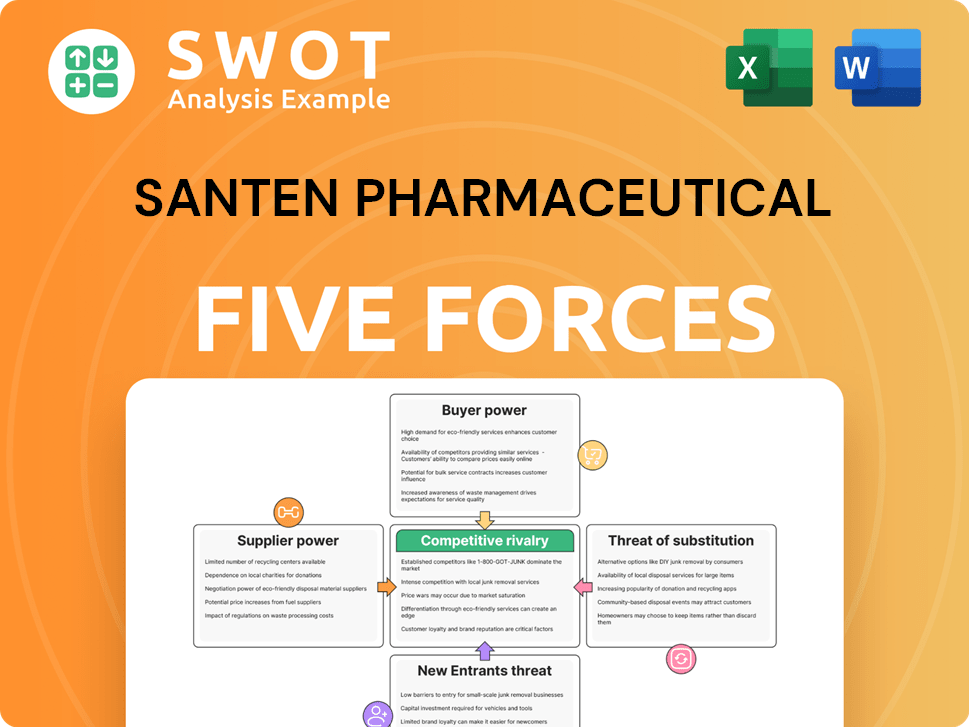
Related Blogs
- What is Competitive Landscape of Santen Pharmaceutical Company?
- What is Growth Strategy and Future Prospects of Santen Pharmaceutical Company?
- How Does Santen Pharmaceutical Company Work?
- What is Sales and Marketing Strategy of Santen Pharmaceutical Company?
- What is Brief History of Santen Pharmaceutical Company?
- Who Owns Santen Pharmaceutical Company?
- What is Customer Demographics and Target Market of Santen Pharmaceutical Company?
Disclaimer
All information, articles, and product details provided on this website are for general informational and educational purposes only. We do not claim any ownership over, nor do we intend to infringe upon, any trademarks, copyrights, logos, brand names, or other intellectual property mentioned or depicted on this site. Such intellectual property remains the property of its respective owners, and any references here are made solely for identification or informational purposes, without implying any affiliation, endorsement, or partnership.
We make no representations or warranties, express or implied, regarding the accuracy, completeness, or suitability of any content or products presented. Nothing on this website should be construed as legal, tax, investment, financial, medical, or other professional advice. In addition, no part of this site—including articles or product references—constitutes a solicitation, recommendation, endorsement, advertisement, or offer to buy or sell any securities, franchises, or other financial instruments, particularly in jurisdictions where such activity would be unlawful.
All content is of a general nature and may not address the specific circumstances of any individual or entity. It is not a substitute for professional advice or services. Any actions you take based on the information provided here are strictly at your own risk. You accept full responsibility for any decisions or outcomes arising from your use of this website and agree to release us from any liability in connection with your use of, or reliance upon, the content or products found herein.